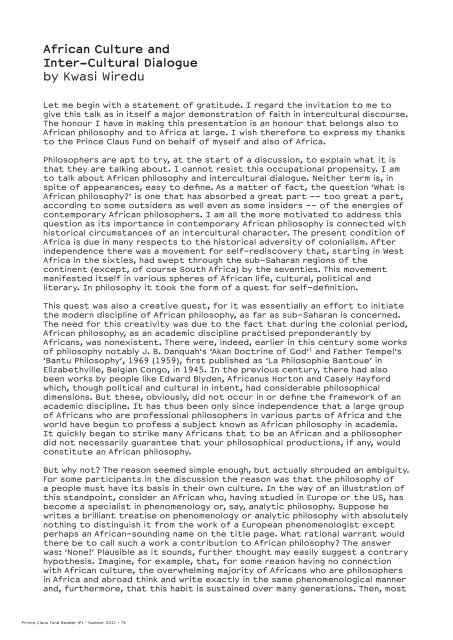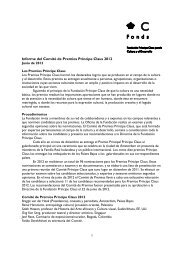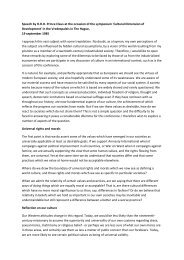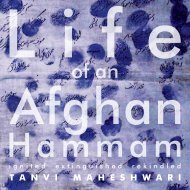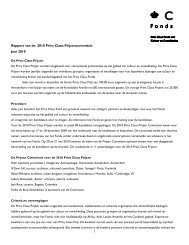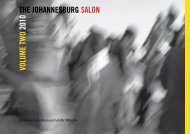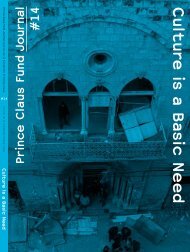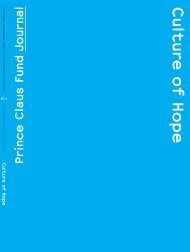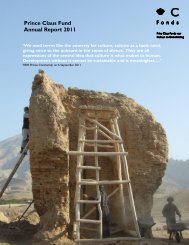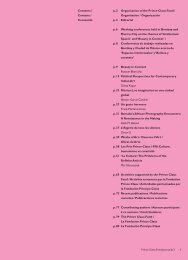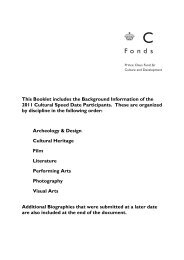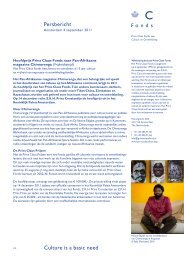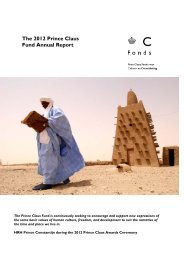3 summer 2011 - Prince Claus Fund
3 summer 2011 - Prince Claus Fund
3 summer 2011 - Prince Claus Fund
- No tags were found...
You also want an ePaper? Increase the reach of your titles
YUMPU automatically turns print PDFs into web optimized ePapers that Google loves.
African Culture andInter-Cultural Dialogueby Kwasi WireduLet me begin with a statement of gratitude. I regard the invitation to me togive this talk as in itself a major demonstration of faith in intercultural discourse.The honour I have in making this presentation is an honour that belongs also toAfrican philosophy and to Africa at large. I wish therefore to express my thanksto the <strong>Prince</strong> <strong>Claus</strong> <strong>Fund</strong> on behalf of myself and also of Africa.Philosophers are apt to try, at the start of a discussion, to explain what it isthat they are talking about. I cannot resist this occupational propensity. I amto talk about African philosophy and intercultural dialogue. Neither term is, inspite of appearances, easy to define. As a matter of fact, the question ‘What isAfrican philosophy?’ is one that has absorbed a great part -- too great a part,according to some outsiders as well even as some insiders -- of the energies ofcontemporary African philosophers. I am all the more motivated to address thisquestion as its importance in contemporary African philosophy is connected withhistorical circumstances of an intercultural character. The present condition ofAfrica is due in many respects to the historical adversity of colonialism. Afterindependence there was a movement for self-rediscovery that, starting in WestAfrica in the sixties, had swept through the sub-Saharan regions of thecontinent (except, of course South Africa) by the seventies. This movementmanifested itself in various spheres of African life, cultural, political andliterary. In philosophy it took the form of a quest for self-definition.This quest was also a creative quest, for it was essentially an effort to initiatethe modern discipline of African philosophy, as far as sub-Saharan is concerned.The need for this creativity was due to the fact that during the colonial period,African philosophy, as an academic discipline practised preponderantly byAfricans, was nonexistent. There were, indeed, earlier in this century some worksof philosophy notably J. B. Danquah’s ‘Akan Doctrine of God’ 1 and Father Tempel’s‘Bantu Philosophy’, 1969 (1959), first published as ‘La Philosophie Bantoue’ inElizabethville, Belgian Congo, in 1945. In the previous century, there had alsobeen works by people like Edward Blyden, Africanus Horton and Casely Hayfordwhich, though political and cultural in intent, had considerable philosophicaldimensions. But these, obviously, did not occur in or define the framework of anacademic discipline. It has thus been only since independence that a large groupof Africans who are professional philosophers in various parts of Africa and theworld have begun to profess a subject known as African philosophy in academia.It quickly began to strike many Africans that to be an African and a philosopherdid not necessarily guarantee that your philosophical productions, if any, wouldconstitute an African philosophy.But why not? The reason seemed simple enough, but actually shrouded an ambiguity.For some participants in the discussion the reason was that the philosophy ofa people must have its basis in their own culture. In the way of an illustration ofthis standpoint, consider an African who, having studied in Europe or the US, hasbecome a specialist in phenomenology or, say, analytic philosophy. Suppose hewrites a brilliant treatise on phenomenology or analytic philosophy with absolutelynothing to distinguish it from the work of a European phenom enologist exceptperhaps an African-sounding name on the title page. What rational warrant wouldthere be to call such a work a contribution to African philosophy? The answerwas: ‘None!’ Plausible as it sounds, further thought may easily suggest a contraryhypothesis. Imagine, for example, that, for some reason having no connectionwith African culture, the overwhelming majority of Africans who are philosophersin Africa and abroad think and write exactly in the same phenomenological mannerand, furthermore, that this habit is sustained over many generations. Then, most<strong>Prince</strong> <strong>Claus</strong> <strong>Fund</strong> Reader #1 · Summer <strong>2011</strong> · 76


